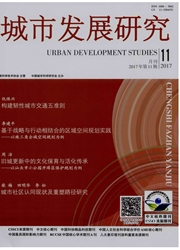

 中文摘要:
中文摘要:
公共空间并非“存在即合理”。公共空间网络结构效率折射出社会网络的重构能力、社会资本的建构强度、社会秩序的重塑能力。新型集中社区作为近年大量涌现的新型居住形态,正面临社会关系重构的巨大压力。本文运用社会学的网络分析法研究公共空间网络,并对苏州新型集中社区D的公共空间网络结构进行实证分析,其结论为:公共空间网络的关联度为0.216、中心势0.358、小世界值1.978,表明空间网络整体关联度不足,呈现出破碎化的特征;商业空间整合效应的发挥受到业态配置的影响;居民社会属性对空间网络结构特征造成一定影响。最后,基于“社会—空间”互动逻辑,以社会网络重构为导向,从集中安置模式、公共空间网络优化2个层面,提出新型集中社区有待进一步研究的方向,以期为当前及未来的集中社区规划建设和公共空间整体优化提供科学合理的依据。
 英文摘要:
英文摘要:
The efficiency of public space network structure reflects the ability of communities to reconstruct their social network, to accumulate social capital, and to rebuild social order. In recent years, as a new form of living and emerging in large numbers, new concentrated communities are facing enormous pressure in reconstructing social relations. Using Social Network Analysis, this study found that: the public space network correlation degree is 0.216, central potential is 0.358, and small world business value is 1.978. These show that the overall association degree of the spatial network is insufficient and the network is fragmented; the integration effect of commercial space is affected by the configuration of businesses; and the social attributes of residents influence the characteristics of the spatial network structure. Finally, with regard to concentrated resettlement model and pubic space network optimization, the author puts forward the direction of further research of new concentrated communities, in order to provide a scientific basis for the current and future planning and development and overall optimization of public space of concentrated communities.
 同期刊论文项目
同期刊论文项目
 同项目期刊论文
同项目期刊论文
 期刊信息
期刊信息
